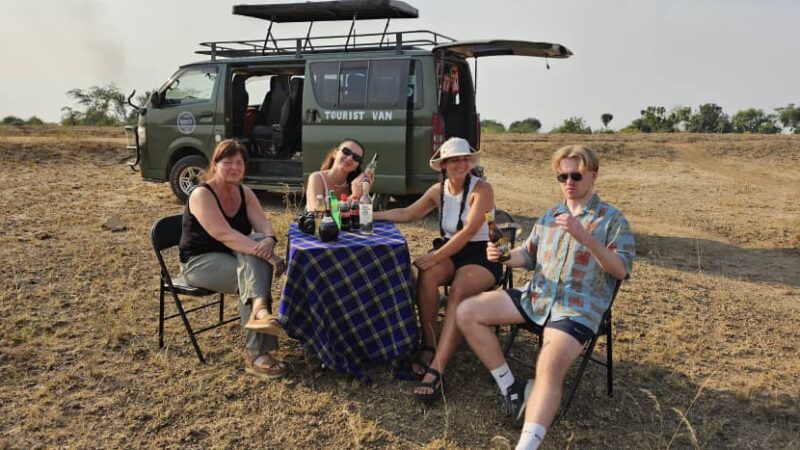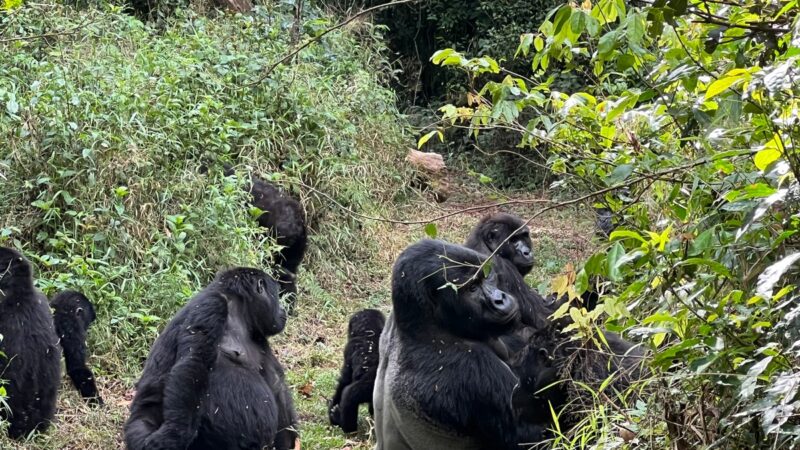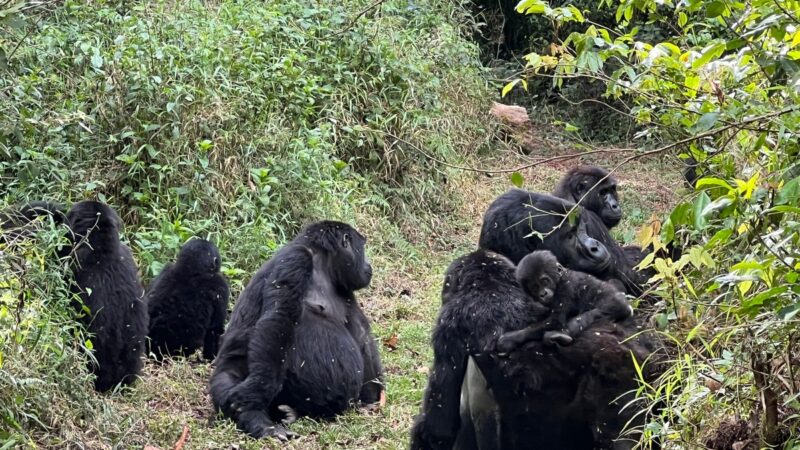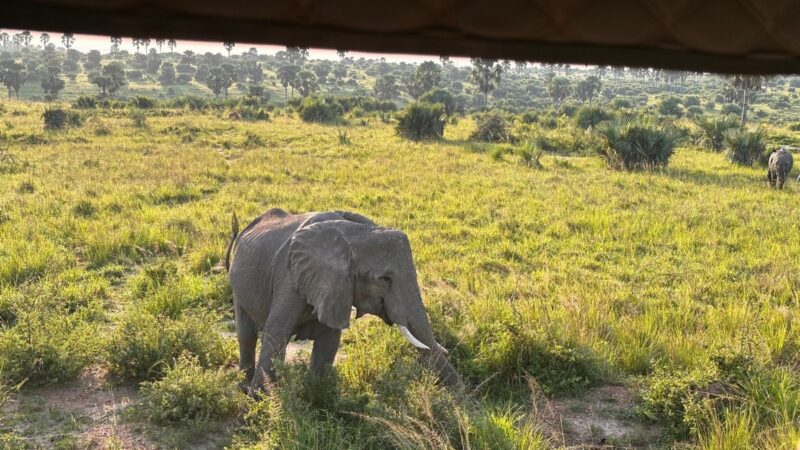East Africa Chimpanzee Tracking Safaris: A Comprehensive Guide to Tanzania, Uganda, and Rwanda
Chimpanzee tracking safaris in East Africa offer an extraordinary opportunity to observe and interact with one of humanity’s closest relatives in their natural habitat. These safaris, conducted in Tanzania, Uganda, and Rwanda, provide unique and immersive experiences, each destination offering its own distinctive features and encounters. This guide provides a detailed exploration of the top locations for chimpanzee tracking, the nature of the experience, and the profound impact of such adventures.
The Top 10 Best Combined East Africa Safaris & Tour Holidays
6-Day Rwanda Uganda Experiential
This 6-Day Rwanda Uganda Experiential Safari starts from Kigali Genocide Memorial and then heads to Nyungwe Forest National Park for chimpanzee trekking and canopy walk.
6-Day Rwanda Uganda Safari
This 6-Day Rwanda Uganda Safari – Gorilla Trekking, Chimpanzee Tracking and Wildlife Expeditions starts in Rwanda with Kigali city tour then to Mgahinga National Park.
6-Day Tanzania Uganda Tour
Embark on an unforgettable adventure with the 6-Day Tanzania Uganda Tour, a journey that seamlessly blends the wild wonders of two East African gems: Tanzania and Uganda.
6-Day Ultimate Rwanda Uganda Safari
A wildlife lover’s dream 6-Day Ultimate Apes and Wildlife Rwanda Uganda Safari spanning two countries: The Rwanda and Uganda wildlife tour. Explore the wonders of volcanic landscapes.
7-Day Tanzania Uganda Rwanda Tour
Embarking on the 7-Day Tanzania Uganda Rwanda Tour is akin to stepping into a realm where nature’s grandeur unfolds before your eyes with each passing day.
7-Day Kenya Uganda Rwanda Safari
Embark on a transformative journey through the heart of East Africa with the 7-Day Kenya Uganda Rwanda Safari, an immersive odyssey that promises a kaleidoscope of experiences.
8-Day African Safari Holiday
8-Day African Safari Holiday Visiting Rwanda and Uganda. Arrive at Kigali International Airport and transfer to your accommodation near Volcanoes National Park. Go on a hike on Mount Bisoke.
9-Day Unforgettable Kenya Safari
This 9-Day Unforgettable Kenya Game Drive Safari offers a well-rounded experience of Kenya’s diverse wildlife and natural beauty. From the rugged landscapes of Tsavo West.
Where to Go: Top Chimpanzee Tracking Destinations
Gombe Stream National Park, Tanzania
Gombe Stream National Park is renowned for its groundbreaking research on chimpanzees, thanks to the work of primatologist Jane Goodall. Located on the shores of Lake Tanganyika, Gombe offers a unique and intimate chimpanzee tracking experience.
Tracking Experience: Gombe is famous for its rich history of chimpanzee research, and tracking here provides an in-depth view of these primates’ behavior and social interactions. The park’s dense forest and rugged terrain offer a more challenging trekking experience, with steep hills and narrow trails. Guides are knowledgeable about the chimpanzees’ habits and can provide detailed insights into their daily lives.
Unique Features: The park’s small size and the long-term study of its chimpanzees allow for a more personalized tracking experience. Visitors can observe complex behaviors and interactions within the chimpanzee communities, which have been closely monitored for decades. Additionally, the picturesque setting along Lake Tanganyika adds a scenic element to the adventure.
Mahale Mountains National Park, Tanzania
Mahale Mountains National Park is another exceptional destination for chimpanzee tracking in Tanzania. Situated in the remote western part of the country, the park offers a pristine and less-visited environment for tracking chimpanzees.
Tracking Experience: Mahale provides an adventurous tracking experience, with the park’s dense forests and mountainous terrain requiring considerable effort to reach chimpanzee groups. The park’s remote location means fewer tourists, offering a more exclusive and tranquil chimpanzee tracking experience. Guides lead visitors through the forest, providing insights into the chimpanzees’ behavior and habitat.
Unique Features: The isolation of Mahale Mountains National Park ensures minimal human interference, enhancing the authenticity of the tracking experience. The park’s diverse landscapes, including pristine beaches along Lake Tanganyika and lush forested slopes, contribute to a rich and varied safari experience.
Kibale National Park, Uganda
Kibale National Park, located in southwestern Uganda, is renowned for its high concentration of chimpanzees and other primates. The park’s diverse habitats make it an excellent destination for chimpanzee tracking.
Tracking Experience: Kibale offers a well-established chimpanzee tracking experience, with well-maintained trails and knowledgeable guides who are skilled in locating and interpreting chimpanzee behavior. The park’s relatively accessible terrain allows for a more comfortable tracking experience compared to more rugged locations. Visitors can expect to spend several hours observing the chimpanzees as they forage, play, and interact.
Unique Features: Kibale is home to over 1,500 chimpanzees and provides an opportunity to encounter these primates in their natural habitat. The park also boasts a rich diversity of other primate species and a variety of bird species, making it a great destination for wildlife enthusiasts. The nearby Bigodi Wetland Sanctuary adds another layer of biodiversity to the experience.
Nyungwe Forest National Park, Rwanda
Nyungwe Forest National Park is one of Rwanda’s top primate tracking destinations, offering opportunities to observe chimpanzees in a lush, ancient rainforest.
Tracking Experience: Chimpanzee tracking in Nyungwe involves navigating through dense, montane rainforest terrain. The park’s experienced guides assist visitors in locating chimpanzee groups and provide information about their behavior and ecology. The tracking experience is physically demanding due to the forest’s rugged terrain, but the rewards are significant in terms of wildlife encounters.
Unique Features: Nyungwe Forest is one of the largest remaining blocks of tropical rainforest in Africa, providing a rich and biodiverse environment. In addition to chimpanzee tracking, visitors can explore the park’s extensive network of trails, which offer opportunities for bird watching and observing other primate species, including colobus monkeys.
The Experience Itself: Immersive Chimpanzee Tracking
The Adventure of Tracking
Chimpanzee tracking safaris offer an exhilarating adventure, combining physical activity with the excitement of wildlife encounters.
Tracking Process: The process of tracking chimpanzees typically involves hiking through varied terrain, from dense forests to steep slopes. Visitors follow signs of chimpanzee activity, such as nests and vocalizations, guided by experienced trackers who use their knowledge to locate the primates.
Wildlife Encounters: The moment of finding a chimpanzee group is both thrilling and rewarding. Observing chimpanzees in their natural habitat, watching their interactions, and hearing their vocalizations provides a unique perspective on their complex social behaviors.
Learning and Discovery
Chimpanzee tracking offers valuable educational opportunities, providing insights into primate behavior, conservation, and the environment.
Behavioral Insights: Observing chimpanzees in the wild allows visitors to witness their complex social structures and behaviors, including grooming, feeding, and communication. Guides and researchers share information about the chimpanzees’ daily lives, their roles within their groups, and their interactions with their environment.
Conservation Education: Many chimpanzee tracking programs emphasize conservation efforts and the challenges faced by chimpanzees in the wild. Learning about these issues helps visitors understand the importance of protecting primate habitats and supporting conservation initiatives.
Emotional and Physical Impact
The experience of tracking chimpanzees can be both physically demanding and emotionally fulfilling.
Physical Demands: Tracking chimpanzees often involves strenuous hiking through rugged terrain, requiring physical stamina and endurance. The effort involved in reaching the chimpanzees adds to the sense of accomplishment and adventure.
Emotional Rewards: The chance to observe chimpanzees up close and witness their natural behaviors creates a profound emotional impact. The experience fosters a deep connection with wildlife and a greater appreciation for the natural world. Contributing to conservation efforts and supporting research also adds to the emotional satisfaction of the safari.
Challenges and Considerations
While chimpanzee tracking offers incredible experiences, there are specific challenges and considerations to keep in mind.
Physical Preparation: The physical demands of tracking chimpanzees require a reasonable level of fitness and preparation. Visitors should be prepared for hiking in challenging conditions and ensure they have appropriate clothing and footwear.
Weather and Conditions: The weather in rainforest and forested environments can be unpredictable, with rain and mud common. Visitors should be prepared for wet conditions and ensure they have waterproof gear.
Respect and Responsibility: Respect for wildlife and adherence to guidelines are crucial for ensuring a positive experience for both visitors and the chimpanzees. Following the instructions of guides and maintaining a respectful distance from the animals helps minimize any potential impact on their behavior and well-being.
Conclusion
Chimpanzee tracking safaris in East Africa offer an extraordinary opportunity to connect with one of our closest relatives in their natural habitat. From the historic Gombe Stream and the remote Mahale Mountains in Tanzania to the diverse Kibale and Nyungwe Forests in Uganda and Rwanda, each destination provides a unique and immersive experience. The adventure combines physical challenges with the profound rewards of observing chimpanzees and contributing to conservation efforts. As travelers explore these remarkable primate habitats, they gain a deeper understanding of wildlife, conservation, and their own connection to the natural world.










